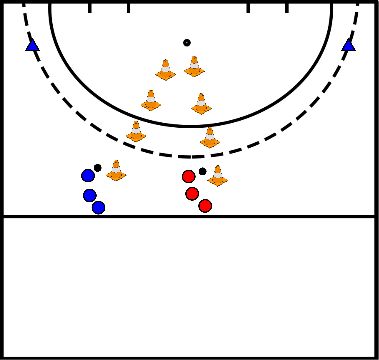Hockey drills
- Last man plays to Left back.
- Left back plays back.
- Last man plays to Right back.
- Right back to incoming Right front.
- Right forward to center forward on head circle.
- Center forward shoots at goal.
- Right forward runs in for tip-in.
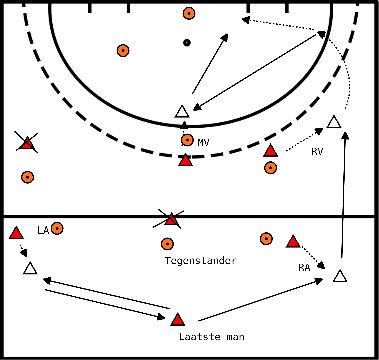
- Jump 3 times
- Sideways to the first pawn
- Sideways back to the back line
- Sprint to the second pawn
- Slow dribble back
- Start at common pace after instruction from trainer

Attack down the right with a tip-in.
- Teach players to execute the attack over the right side.
- Focus on using a tip-in as a finishing technique.
- Important to recognize the timing and position of the tip-in.
- Players should also learn when to take the ball and turn away from the goalkeeper.
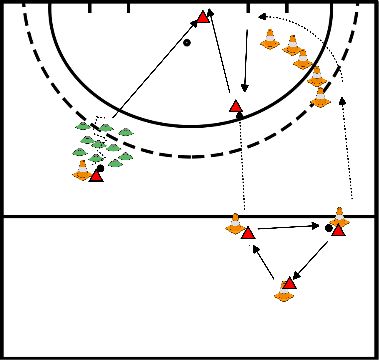
- Player blue 1 plays the ball with a controlled push or flats diagonally onto the forehand of player red 2.
- Player red 2 takes the ball on the forehand and rounds on goal.
- Player red 1 plays the ball with a controlled push or flats diagonally onto the backhand of player blue 2.
- Player blue 2 takes the ball on the backhand and rounds on goal.
Points of focus:
- The focus in this exercise is on the approach.
- Make yourself small when making the approach.
- Try to pick up the pace of the ball.
- Let the ball roll past you and take the ball as late as possible.
- Make sure that the ball does not rise when taking it on. So keep your stick straight and not angled.
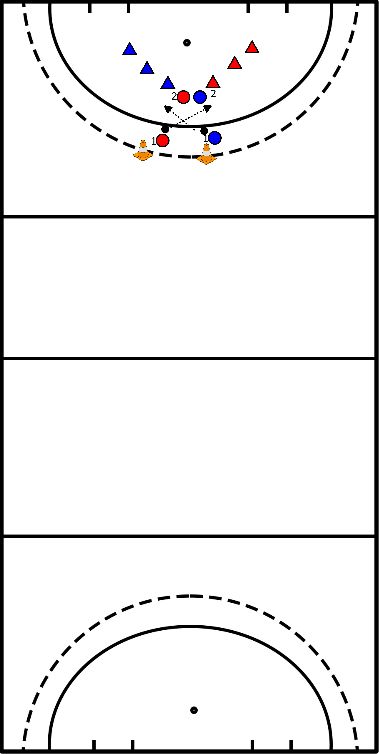
- All players start with a ball in the square and dribble/drive around in it.
- The trainer determines the moment to call stop!
- At that moment, all players make sure the ball is stopped as quickly as possible.
- Does the ball roll on. So does the player not have control of the ball he is off.
- When you are off, you wait by the side.
- The trainer may point to a waiting player to call stop!
- As a trainer, at some point you may indicate that the players should dribble faster.
- This makes it more difficult to stop the ball.
Note: the ball must be really still, so it should not roll a little bit.
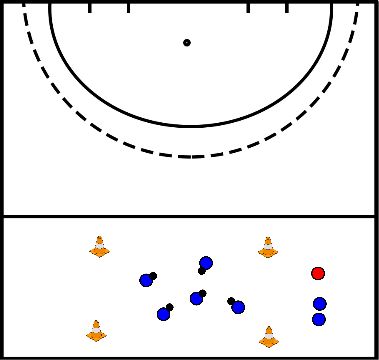
- A and B both have a ball and simultaneously play 5 passes to each other.
- A and B float to the other side of the square.
- Here they play over again 5 times, with 2 balls at the same time.
- A and B float back to the starting point and leave their ball there.
- Both players now sprint back and forth to the 23 meter line and back.
- Both players pick up the ball again, drift towards the circle and finish on goal.
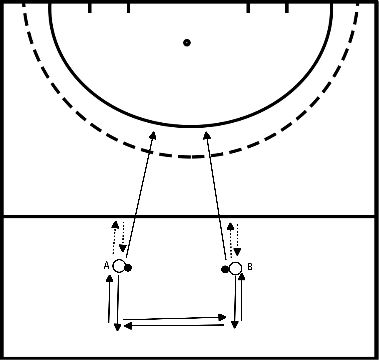
- On the sides of the courts are balls.
- Each goalt in the corner of the field has its own color.
- In each field stand 2 players.
Exercise
- The players start in the middle of the field.
- When the trainer calls a color, the players must grab a ball from the side of the field as quickly as possible.
- The player who grabs the ball first must score in the color goal called by the trainer. The other player then goes to defend.
- If the attacking player scores in the said color goal, the players start again and the trainer calls another color and so the exercise repeats itself.
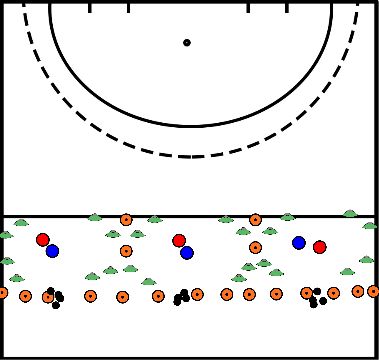
- Except for one player -red-, all players -blue- have one ball.
- The red defender tries to work all balls out of the box.
- If a blue player loses his/her ball and it has been played out of the box, she/he stands with her/his legs apart.
- The player can be redeemed by another blue player; This one plays the ball through the legs -panna- and blue has a player back in the box.
- Continue until all players are off.
Points of attention:
- If it takes too long or you notice in advance that one defender is too little, appoint an extra defender.
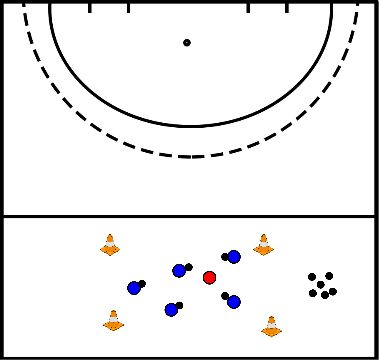
- Position play 0 against 0
- Then 3 against 1
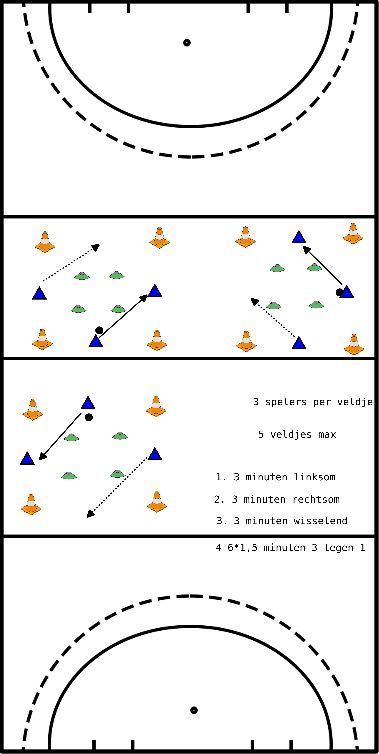
Three-color game
- Players all have a ball and dribble through the box of pawns.
- Scattered through the box are pawns of three different colors; at least 4 of each color.
- Trainer has in hand of all three colors -i.e. in the example red, blue and white.
- Trainer puts e.g. a blue pawn in the air --> All players try to drive around all blue pawns as quickly as possible.
- The first two players who have driven around all blue pawns get a point.
- Then a new round begins and the trainer chooses another color pawn -or the same color.
- Etc.
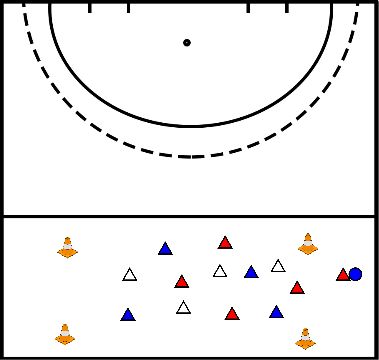
Basic techniques -> Push pass out of the run.
- The trainer makes 3-pairs -if you can't work out the numbers of 4-pairs-; 2 players on one side of the playing field, 1 on the other side.
- The side of the pair always starts with the ball.
- Player 1 starts by floating to the other side.
- Halfway across the playing field he gives a push pass to player 2 on the opposite side.
- Player 2 takes the ball and does the same as Player 1 and gives the ball with a push pass to Player 3 etc.
- The player who passed the ball first runs on to Player 2's spot, Player 2 to Player 3's spot etc.
Points of attention:
- Drive the ball well in front of your body -i.e. not next to it or behind it- -> Look well over the ball.
- Drive the ball well outside with your left elbow.
- The exercise must be performed technically well before you can increase speed.
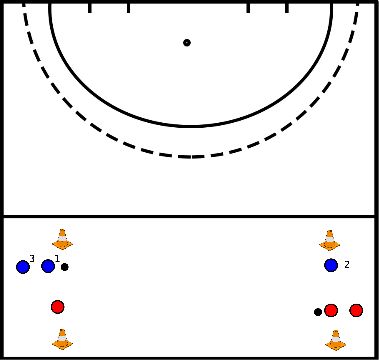
Relay
- As trainers, create two equal teams.
- Start the relay at the trainer's signal.
- The players slalom around the pawns. Both ball and body around the pawns. And rounds on goal; push or flatten.
- If the player scores, he may immediately sprint back and tap the next player.
- If the player misses, he must take a detour via the blue pawn at the side of the field and then sprint back and tap the next player.
- When it's your turn, you sit on the floor.
- Depending on the number of players, you can also choose to have all players take 2 or 3 turns.
- The next player may not start until he is tapped by the player in front of him.
- The team that has all players on the ground first wins the relay.
- There are different types of slalom to apply in this exercise:
- Normal slalom
- Slalom in which the player's body and ball are to the left or right of the pawn line
- Slalom where the ball is to the left of the row of pawns and the body is to the right
